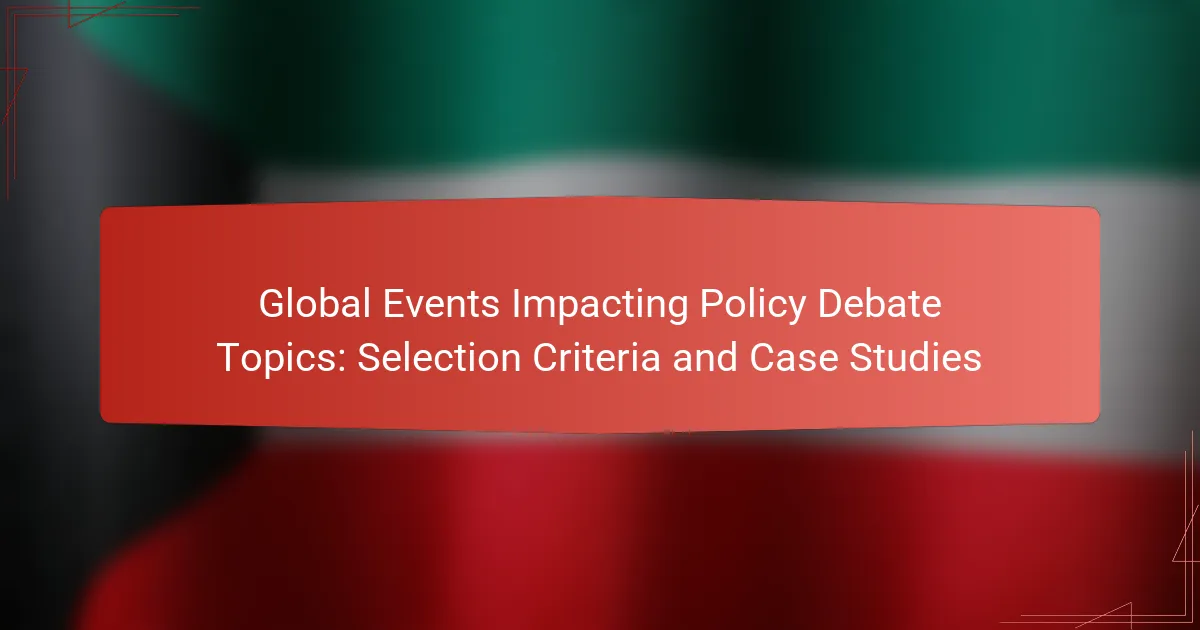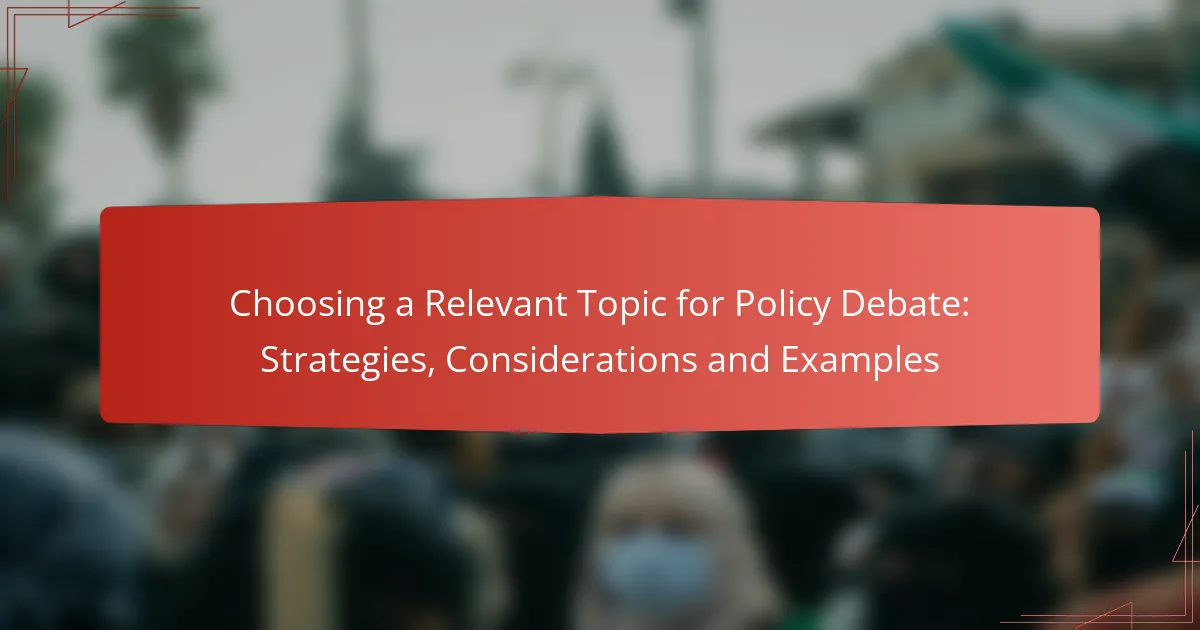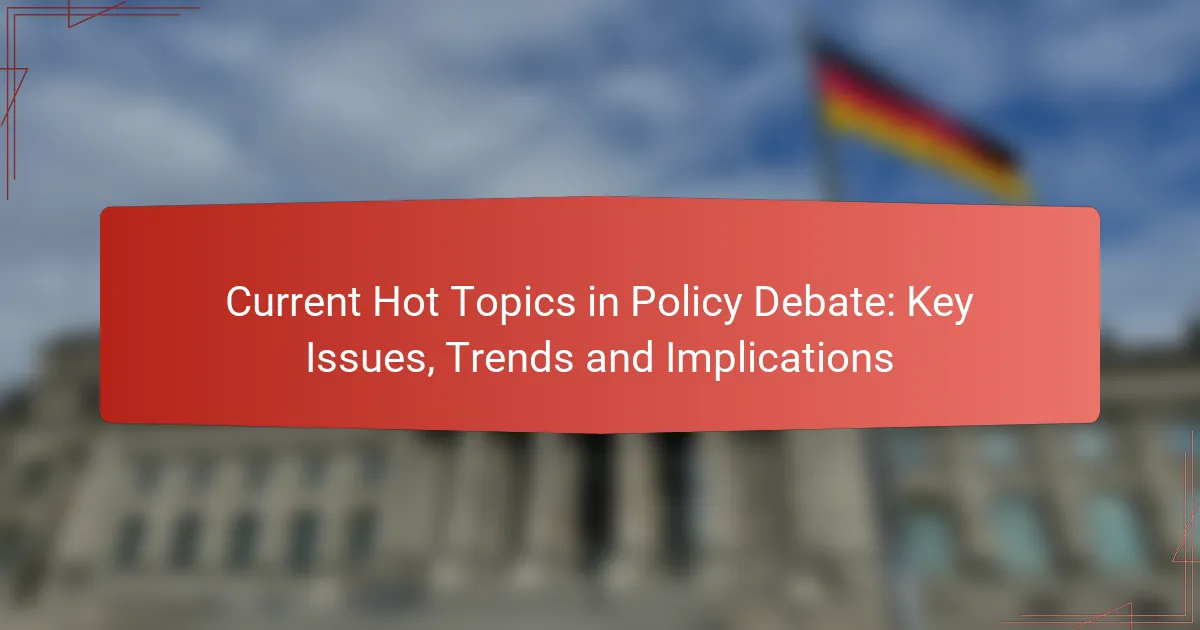Global events play a crucial role in shaping policy debates by influencing public opinion and altering political priorities. Events such as climate change conferences, health crises, and geopolitical conflicts serve as catalysts for discussions that drive legislative changes. By examining case studies like the Paris Agreement and COVID-19 responses, we can better understand how these occurrences impact policy selection criteria and the broader political landscape.
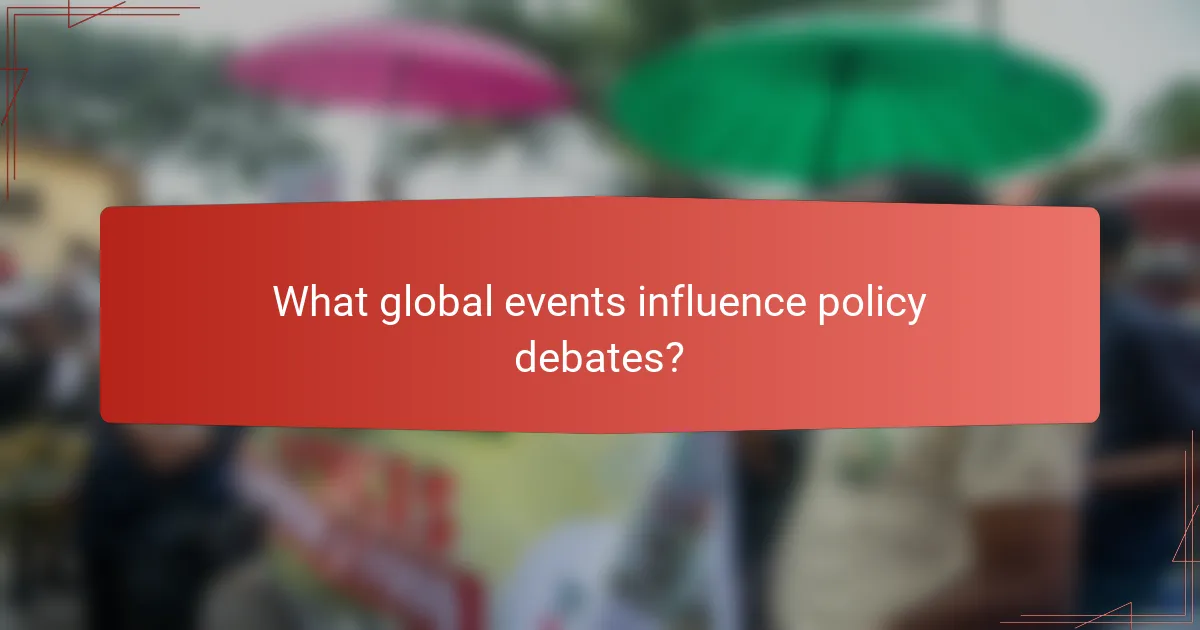
What global events influence policy debates?
Global events significantly shape policy debates by altering public opinion, influencing political agendas, and prompting legislative changes. Key events such as climate change conferences, international trade agreements, global health crises, geopolitical conflicts, and technological advancements serve as catalysts for discussions and decisions in various policy arenas.
Climate change conferences
Climate change conferences, like the annual COP meetings, bring together world leaders to negotiate and commit to environmental policies. These events often lead to new agreements that can reshape national policies on energy, emissions, and sustainability practices.
For instance, the Paris Agreement set ambitious targets for reducing greenhouse gas emissions, influencing countries to adopt cleaner technologies and renewable energy sources. Policymakers must consider the implications of these agreements on local economies and industries.
International trade agreements
International trade agreements, such as NAFTA or the EU’s trade deals, directly impact economic policies by regulating tariffs, trade barriers, and market access. These agreements can shift the balance of power in domestic industries, prompting debates on labor standards and environmental protections.
Countries often negotiate terms that reflect their economic priorities, which can lead to significant changes in local job markets and consumer prices. Policymakers should assess the long-term effects of these agreements on their economies and populations.
Global health crises
Global health crises, exemplified by the COVID-19 pandemic, can rapidly change public health policies and funding priorities. Such events highlight the need for robust healthcare systems and prompt discussions on preparedness, vaccine distribution, and health equity.
In response to health emergencies, governments may implement emergency regulations and funding reallocations, which can have lasting effects on healthcare infrastructure and policy frameworks. Policymakers must prioritize resilience and adaptability in health policy planning.
Geopolitical conflicts
Geopolitical conflicts, such as wars or territorial disputes, often lead to shifts in national security policies and international relations. These events can prompt countries to reassess their defense strategies, alliances, and foreign aid commitments.
For example, tensions in Eastern Europe have led to increased military spending and changes in diplomatic relations among NATO members. Policymakers need to consider the broader implications of these conflicts on regional stability and international cooperation.
Technological advancements
Technological advancements, including innovations in artificial intelligence and renewable energy, influence policy debates by creating new opportunities and challenges. These developments can lead to discussions on regulation, ethical considerations, and economic impacts.
For instance, the rise of AI has prompted debates on data privacy, job displacement, and the need for new regulatory frameworks. Policymakers should stay informed about emerging technologies to effectively address their implications on society and the economy.
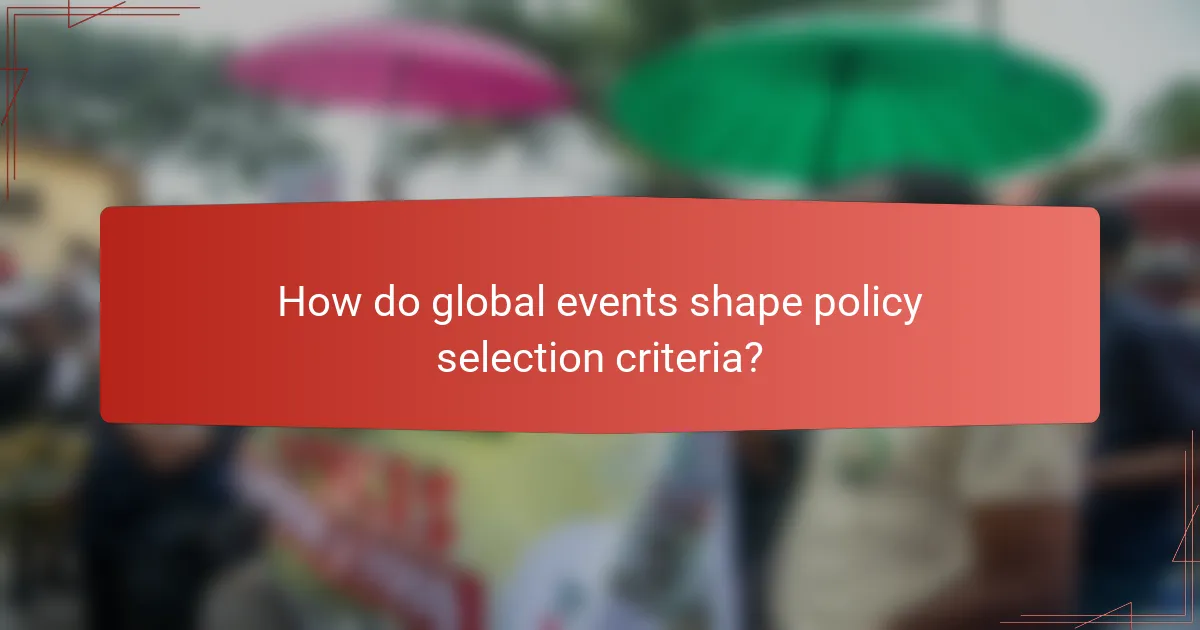
How do global events shape policy selection criteria?
Global events significantly influence policy selection criteria by shifting priorities and altering the landscape of public discourse. Policymakers often adapt their strategies based on emerging trends and pressing issues that arise from these events, ensuring that their policies remain relevant and effective.
Public opinion trends
Public opinion trends are crucial in shaping policy selection criteria, as they reflect the collective attitudes and beliefs of the populace. For instance, during a health crisis, there is often a surge in public support for policies that prioritize healthcare funding and accessibility. Policymakers must monitor these trends through surveys and social media analysis to align their proposals with constituents’ expectations.
To effectively gauge public sentiment, consider utilizing tools like sentiment analysis or regular polling. This can help identify shifts in opinion that may necessitate adjustments in policy focus or urgency.
Stakeholder engagement
Engaging stakeholders is essential for developing effective policy selection criteria. Stakeholders, including community leaders, businesses, and advocacy groups, provide valuable insights that can shape policy proposals. Their involvement ensures that diverse perspectives are considered, which can lead to more comprehensive and accepted policies.
To enhance stakeholder engagement, policymakers should establish regular communication channels and forums for discussion. This could involve town hall meetings or online platforms where stakeholders can voice their concerns and suggestions.
Media coverage impact
Media coverage plays a significant role in influencing policy selection criteria by shaping public perception and highlighting specific issues. When a global event receives extensive media attention, it can elevate the urgency of related policy discussions, prompting quicker action from lawmakers. For example, widespread coverage of climate change can lead to increased support for environmental policies.
Policymakers should be aware of the media landscape and strategically communicate their policy initiatives to ensure they receive appropriate coverage. Crafting press releases and engaging with journalists can help frame the narrative around policy proposals effectively.
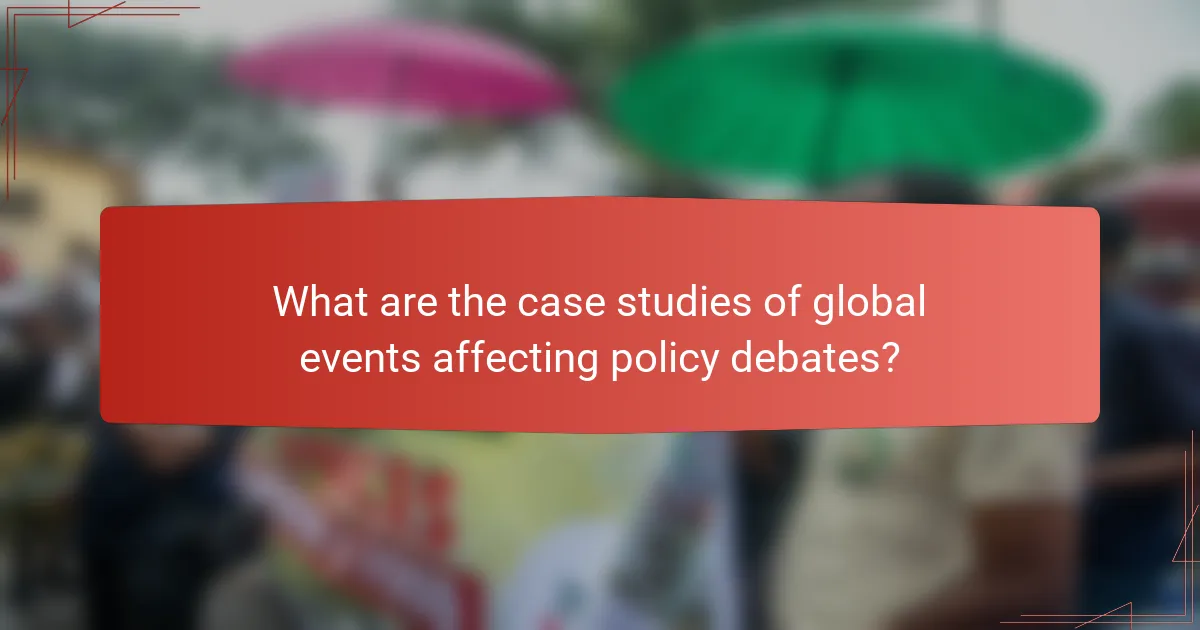
What are the case studies of global events affecting policy debates?
Global events significantly shape policy debates by highlighting urgent issues and influencing public opinion. Case studies such as the Paris Agreement outcomes, COVID-19 response policies, and Brexit negotiations illustrate how these events can drive legislative changes and alter political landscapes.
Paris Agreement outcomes
The Paris Agreement, established in 2015, aimed to unite countries in combating climate change by limiting global warming. Its outcomes have led to renewed policy discussions on emissions reduction targets and renewable energy investments across various nations.
Countries are now evaluating their commitments, with many setting more ambitious goals. For instance, the European Union has proposed a target to reduce greenhouse gas emissions by at least 55% by 2030 compared to 1990 levels, influencing national policies and corporate strategies.
COVID-19 response policies
The COVID-19 pandemic prompted governments worldwide to implement rapid policy changes regarding public health, economic support, and social behavior. These responses have sparked debates on healthcare infrastructure, crisis management, and the balance between individual freedoms and public safety.
For example, many countries introduced stimulus packages to support businesses and individuals, leading to discussions on fiscal responsibility and long-term economic impacts. The pandemic also accelerated the adoption of digital health technologies, which may reshape future healthcare policies.
Brexit negotiations
Brexit negotiations have profoundly influenced policy debates in the United Kingdom and the European Union. The decision to leave the EU raised questions about trade agreements, immigration policies, and regulatory standards, necessitating extensive negotiations.
As the UK navigates its post-Brexit landscape, it faces challenges in establishing new trade relationships while maintaining economic stability. The outcome of these negotiations will likely impact various sectors, including agriculture, finance, and manufacturing, shaping future policy discussions on sovereignty and economic cooperation.
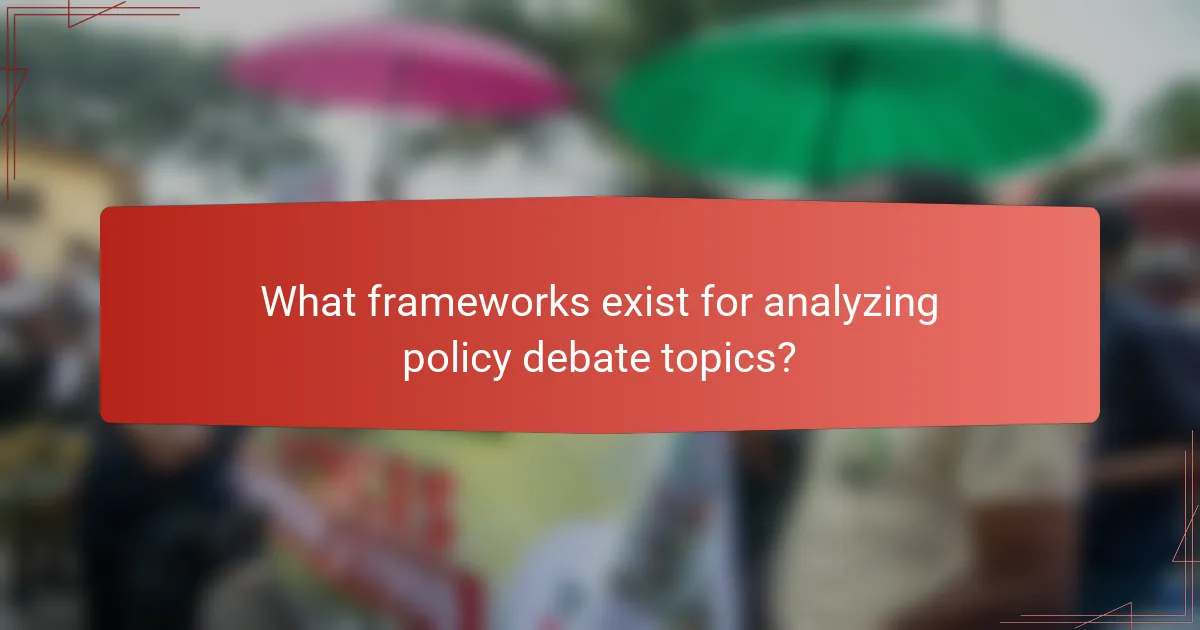
What frameworks exist for analyzing policy debate topics?
Several frameworks can be utilized to analyze policy debate topics, helping debaters evaluate the implications and effectiveness of proposed policies. Among the most common are SWOT and PESTLE analyses, which provide structured approaches to assess strengths, weaknesses, opportunities, threats, and external factors affecting policy decisions.
SWOT analysis
SWOT analysis is a strategic planning tool that identifies the Strengths, Weaknesses, Opportunities, and Threats related to a policy debate topic. Strengths and weaknesses focus on internal factors, such as the policy’s feasibility and potential impact, while opportunities and threats examine external elements like public opinion and regulatory challenges.
To conduct a SWOT analysis, start by listing the strengths of the policy, such as its alignment with current societal needs or its cost-effectiveness. Next, identify weaknesses, such as potential opposition or resource constraints. Opportunities may include emerging trends that support the policy, while threats could involve competing policies or economic downturns.
PESTLE analysis
PESTLE analysis evaluates the Political, Economic, Social, Technological, Legal, and Environmental factors that influence a policy debate topic. This framework helps debaters understand the broader context in which a policy operates and the various external pressures that may affect its success.
When performing a PESTLE analysis, consider political factors such as government stability and party support, economic conditions like inflation or unemployment rates, and social trends that may impact public acceptance. Additionally, assess technological advancements that could facilitate or hinder policy implementation, legal regulations that must be adhered to, and environmental considerations that may arise from the policy’s effects.
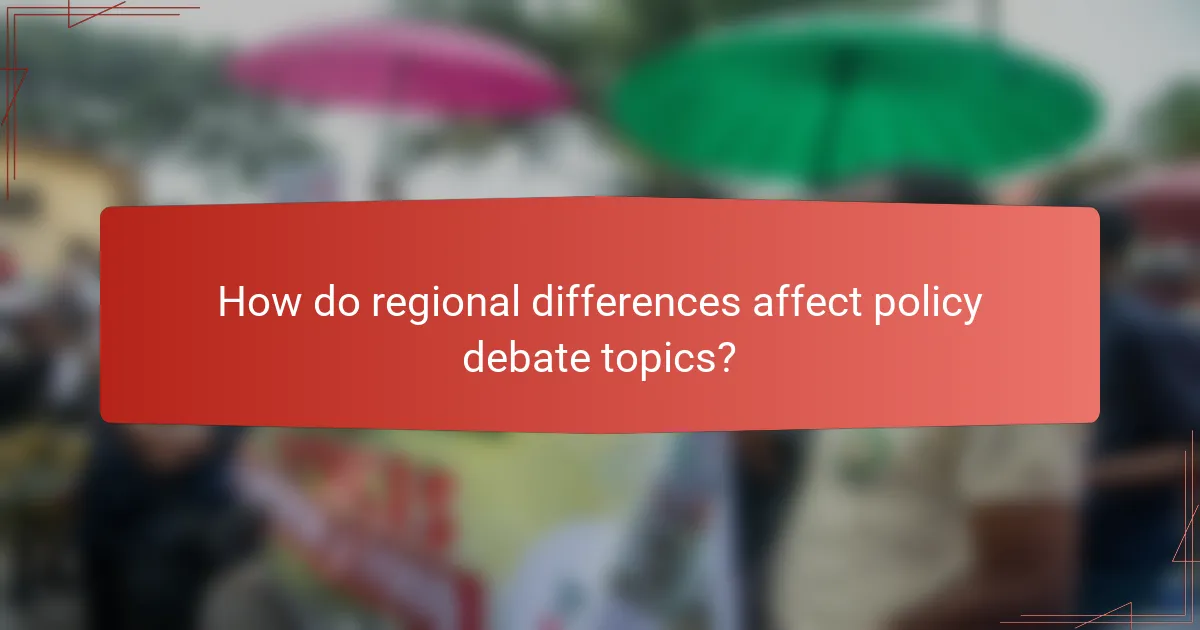
How do regional differences affect policy debate topics?
Regional differences significantly shape the topics of policy debates, as cultural, economic, and political contexts vary widely. These differences influence the priorities and perspectives that emerge in discussions, leading to distinct policy focuses across regions.
North America vs Europe
In North America, policy debates often center around issues like healthcare reform, immigration, and gun control, reflecting a more individualistic culture. In contrast, European debates frequently emphasize social welfare, environmental sustainability, and labor rights, driven by a collective approach to governance.
For example, while the U.S. may prioritize deregulation and market-driven solutions, many European countries advocate for stronger regulations and public services. This divergence can lead to different outcomes in international negotiations and collaborations.
Asia-Pacific perspectives
The Asia-Pacific region presents a unique blend of policy debate topics influenced by rapid economic growth and diverse political systems. Countries like China focus on economic development and technological advancement, while others, such as Japan, emphasize aging populations and sustainable practices.
Additionally, regional security issues, such as territorial disputes and trade relations, are prominent in policy discussions. Stakeholders must navigate these complexities, balancing economic ambitions with social and environmental responsibilities to foster effective policies.
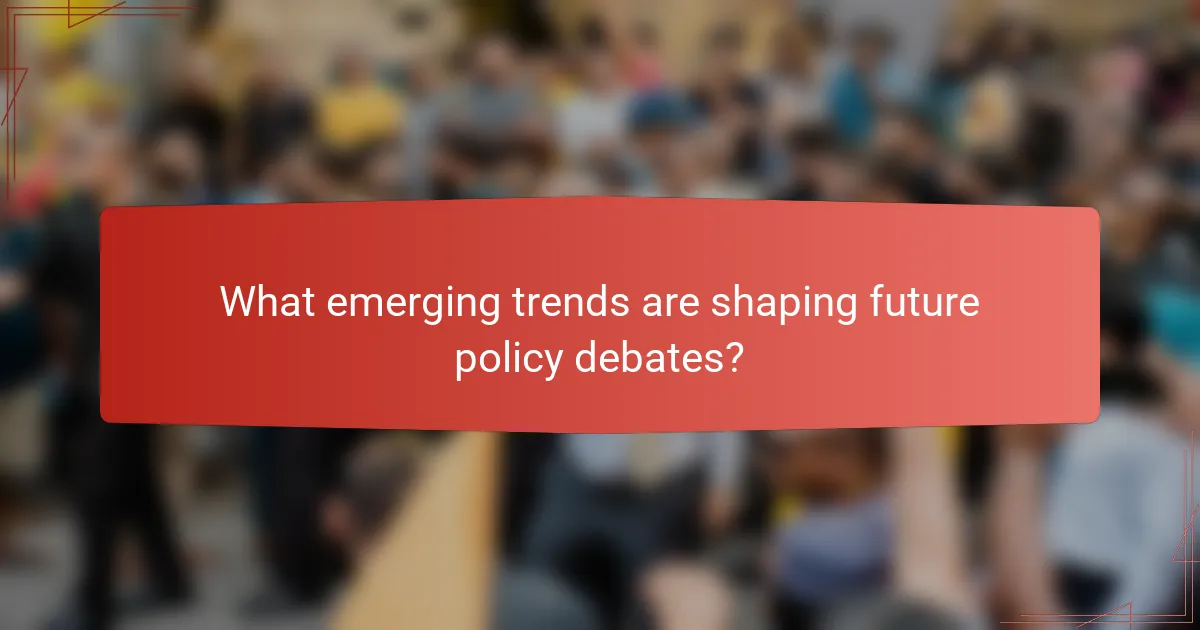
What emerging trends are shaping future policy debates?
Emerging trends such as digital governance and social justice movements are significantly influencing future policy debates. These trends not only reflect changing societal values but also drive the need for adaptive regulatory frameworks that address contemporary challenges.
Digital governance
Digital governance refers to the use of digital technologies to enhance the efficiency and transparency of government operations. This trend emphasizes the importance of data management, cybersecurity, and citizen engagement in policy-making processes.
Key considerations include ensuring equitable access to technology and protecting citizens’ privacy. Governments are increasingly adopting open data initiatives and e-governance platforms to foster transparency and accountability.
For example, countries like Estonia have successfully implemented digital identity systems, allowing citizens to access various public services online, which streamlines processes and reduces bureaucratic delays.
Social justice movements
Social justice movements are reshaping policy debates by advocating for equity and inclusion across various sectors. These movements highlight issues such as racial equality, gender rights, and environmental justice, pushing policymakers to address systemic inequalities.
Policymakers must consider the diverse perspectives and needs of marginalized communities when crafting legislation. Engaging with grassroots organizations can provide valuable insights and foster more inclusive policies.
For instance, the Black Lives Matter movement has prompted discussions on police reform and accountability in several countries, leading to legislative changes aimed at reducing systemic bias in law enforcement practices.
